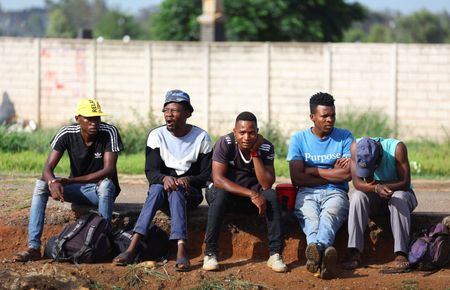By Ayman Al-Warfali
BENGHAZI, Libya (Reuters) -Libya’s oil blockade widened on Wednesday with eastern leaders demanding western authorities back down over the replacement of the central bank governor, a key position in a state where control over oil revenue is the biggest prize for all factions.
The crisis over control of the Central Bank of Libya threatens a new bout of instability in a major oil producer split between eastern and western factions that have drawn backing from Turkey and Russia.
On Wednesday two oil engineers said the Sarir field had almost completely halted its 209,000 barrel per day output after disruption this week at the El Feel, Amal, Nafoora and Abu Attifel fields.
Eastern factions have vowed to keep Libya’s oil output shuttered until the internationally recognised Presidency Council and Government of National Unity in Tripoli, in the west, return veteran central bank governor Sadiq al-Kabir to his post.
Presidency Council chief Mohammed al-Menfi said he was dismissing Kabir earlier this month, a move rejected by the eastern-based House of Representatives parliament and eastern commander Khalifa Haftar’s Libyan National Army.
Armed factions mobilised in the northwest last week in response to the crisis, underscoring the risk of fighting.
Libya has had little peace since the 2011 NATO-backed uprising that ousted Muammar Gaddafi, and the east-west split dates to 2014. Despite four years of comparative peace since a 2020 ceasefire, the rival factions remain mired in a standoff.
Political institutions, set up during successive attempted transitions since the 2011 revolution, have only questionable legitimacy but diplomacy to hold elections to replace them has stalled.
Authorities in the east, home to most of Libya’s oilfields, said on Monday that all production and exports would be halted, though some ports under eastern control operated normally on Wednesday.
Force majeure had already been announced earlier this month on exports at the 300,000 bpd Sharara oilfield.
Consulting firm Rapidan Energy Group estimated production disruptions of between 900,000 and 1 million bpd for several weeks.
Analysts, however, said even that might not drive up oil prices. Benchmark Brent oil prices were down about 1.6% at $78.28 per barrel as of 1440 GMT. [O/R]
Despite the scale and length of the blockade, “I’m not sure it’s enough to break through this over-powering macro bearish sentiment that continues to shape the market,” Rapidan’s Geopolitical Risk Service Director Fernando Ferreira told Reuters.
In July, Libya, a member of the Organization of the Petroleum Exporting Countries, was producing about 1.18 million barrels of oil per day.
Ports in the country’s hydrocarbon-rich Oil Crescent operated normally on Wednesday and had not received orders to halt exports, five engineers told Reuters.
Four vessels were at ports in the central region to load 600,000 barrels each, they said – two at Es Sidra, one at Brega and one at Zueitina.
(Reporting by Ayman Al-Warfali; writing by Yousef Saba and Angus McDowall; editing by Jason Neely, Barbara Lewis and Jan Harvey)











